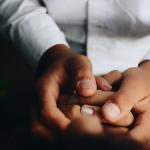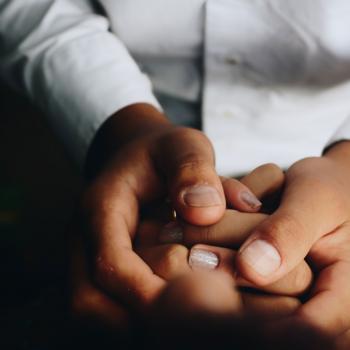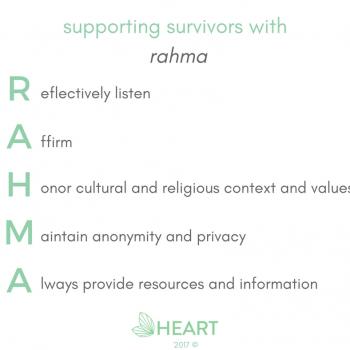As more individuals feel more empowered to disclose and speak up about their sexual assault, it is increasingly important that everyone have the tools to respond compassionately and in a victim-centric way. Our last post introduced the RAHMA principles, a simple framework inspired by the Arabic word for compassion, that we created to help guide “first responders” when they find themselves being disclosed to. Often, individuals choose to disclose to their friends or family: a parent, a relative, an older sibling, a neighbor, or a teacher. For this reason, we believe these are life skills that everyone should have. This post will build model a response using the RAHMA principles demonstrate what a victim-centric response looks like.
To review, RAHMA stands for:
Reflectively Listen
Affirm & Believe
Honor cultural and religious context & values
Maintain anonymity & privacy
Always Provide Resources and Information
Reflectively Listen
If a person expresses a feeling or emotion, be sure to reflect that back to them so they feel understood and heard.
Example:
A survivor discloses:
“My neighbor’s son has been sexually assaulting me. I’m scared and I don’t know what to do because I’m afraid no one will believe me. He is a hafiz (scholar of the Quran) and high performing college student, on his way to medical school.”
You say:
“Thanks for trusting me with your story. You have experienced assault and you’re a bit nervous about the situation and you are looking for someone to talk to. Is this right?”
The wrong response would be:
“I just can’t believe it.” “How long has this been happening?” “Why didn’t you tell me before?” “Why didn’t you stop him?”
While the disclosure may cause you alarm or be shocking, expressing your own shock or disbelief is not what the individual is looking for in that moment of initial disclosure.
Affirm & Believe
Many survivors make “first contact” about sexual violence after careful deliberation and hesitation, and you may be the first person that someone has talked to about these issues. Disclosing to someone is an incredibly bold and brave step.
Example:
A survivor discloses:
“My neighbor’s son has been sexually assaulting me. I’m scared and I don’t know what to do because I’m afraid no one will believe me. He is a hafiz and high performing college student, on his way to medical school.”
You say:
“Thanks for trusting me with your story. You have experienced assault and you’re a bit nervous about the situation and you are looking for someone to talk to. Is this right? I believe you and this is not your fault. You aren’t alone. There are a lot of resources out there for you.”
The wrong response would be:
“Are you sure it happened that way?” “Maybe you misunderstood their actions.” “Why were you over at his house when no one was home?”
Not believing a victim, blaming them for the assault, interrogating them, or siding with the abuser can have a lifelong impact on a victim’s ability to heal, seek counseling and justice, and feel safe.
Honor cultural and religious values, with compassion
During disclosures, the individual may rely on cultural or religious values or attitudes that can impact their ultimate decision-making. As much as you may dislike a cultural value or attitude, it may be something the individual holds on to and deeply respects.
A survivor discloses:
“My neighbor’s son has been sexually assaulting me. I’m scared and I don’t know what to do because I’m afraid no one will believe me. He is a hafiz and high performing college student, on his way to medical school. I know I can file a police report, but I don’t know if I want to. I am afraid my fiancé will break up with me and I will never get married. I am so ashamed of this happened to me. It is all my fault. What should I do?”
You say:
“Thanks for trusting me with your story. You have experienced assault and you’re a bit nervous about the situation and you are looking for someone to talk to. Is this right? I believe you and this is not your fault. You aren’t alone. There are a lot of resources out there for you.
It’s natural to be concerned about the cultural and social consequences you may experience. It is often the case that Muslims are blamed, stigmatized, and made to be outcasts after experiencing something traumatic like you did. So I can understand how your thoughts can lead to blaming yourself; however, from what I know about you, you believe that Islam is a religion of fairness and what was done to you is UNFAIR.
Moreover, it is completely understandable that you are concerned about your future, how your fiancé will react, or whether or not you will be married, especially coming from a community that highly values marriage. You do not have to tell anyone – your parents, your partner, your friends – if you do not want to. This is information you have absolute right to protect, especially if you fear certain social consequences. However, I do encourage you to speak to a professional who is qualified to help you make sense of what happened. I have some people in mind, would you like to take a look at the list and call one of them together? I am here to support you, you are not alone.”
The wrong response would be:
“You don’t want to marry a man like that anyway.” “Don’t worry about that – that is just old school patriarchy garbage.”
Notice how this response acknowledges that guilt and shame associated with this situation is normal and part of their cultural experience and understanding. It also does not discount or shame the individual for fearing very (real) social consequences.
Maintain Privacy
Do not share their identity with anyone, and follow the lead of lawyers and advocates who are trained in maintaining confidentiality. Even sharing details you may not consider as immediately identifying, like the region they live in, or their age, with others may compromise their identity especially if they come from a tight knit community.
Example:
A survivor discloses:
“My neighbor’s son has been sexually assaulting me. I’m scared and I don’t know what to do because I’m afraid no one will believe me. He is a hafiz and high performing college student, on his way to medical school. I know I can file a police report, but I don’t know if I want to. I am afraid my fiancé will break up with me and I will never get married. I am so ashamed of this happened to me. It is all my fault. What should I do?”
You say:
“Thanks for trusting me with your story. You have experienced assault and you’re a bit nervous about the situation and you are looking for someone to talk to. Is this right? I believe you and this is not your fault. You aren’t alone. There are a lot of resources out there for you.
I volunteer at the local crisis center. I have seen many young people who have been in similar situations. They have come to the clinic for various reasons – it’s different for everyone. I am happy to help direct you to the information and resources you are seeking, and I will do everything to honor your privacy and maintain confidentiality so that you feel safe and comfortable as you seek resources.”
The wrong response:
Sharing their identity with people at the mosque, sharing their story with others who may be connected to that story. Even sharing details about the perpetrator can single out who the victim might be.
Always offer resources and information
Meet them where they are, and gently offer resources and information with compassion, but respect their agency to make the decision that is best for them.
A survivor discloses:
“My neighbor’s son has been sexually assaulting me. I’m scared and I don’t know what to do because I’m afraid no one will believe me. He is a hafiz and high performing college student, on his way to medical school. I know I can file a police report, but I don’t know if I want to. I am afraid my fiancé will break up with me and I will never get married. I am so ashamed of this happened to me. It is all my fault. What should I do?”
You say:
“Thanks for trusting me with your story. You have experienced assault and you’re a bit nervous about the situation and you are looking for someone to talk to. Is this right? I believe you and this is not your fault. You aren’t alone. There are a lot of resources out there for you.
I volunteer at the local crisis center. I have seen many young people who have been in similar situations. They have come to the clinic for various reasons – it’s different for everyone. I am happy to help direct you to the information and resources you are seeking, and I will do everything to honor your privacy and maintain confidentiality so that you feel safe and comfortable as you seek resources.
One thing you could do is find a local crisis center in your community that offers counseling. If the assault is very recent, you can also get a rape kit done at the hospital. We can also help you file a police report if that’s something you’d like to do.
There’s also great information available on sites like rainn.org and nsvrc.org. You can also call the following national hotlines: https://hotline.rainn.org/online/terms-of-service.jsp
I am here to help you as you navigate this and direct you to the resources you need.”
The wrong response:
“You should definitely get a rape kit.” “Filing a police report would be a bad idea.”
Disclosing sexual assault is a complicated and personal decision. Often, victims don’t disclose because of the numerous emotions they may be feeling or the many barriers to disclosure. Other times, victims do disclosed and are not believed and are met with blame and shame. It is time we commit to a culture shift and #respondwithRAHMA to those who often suffer for too long in silence.













